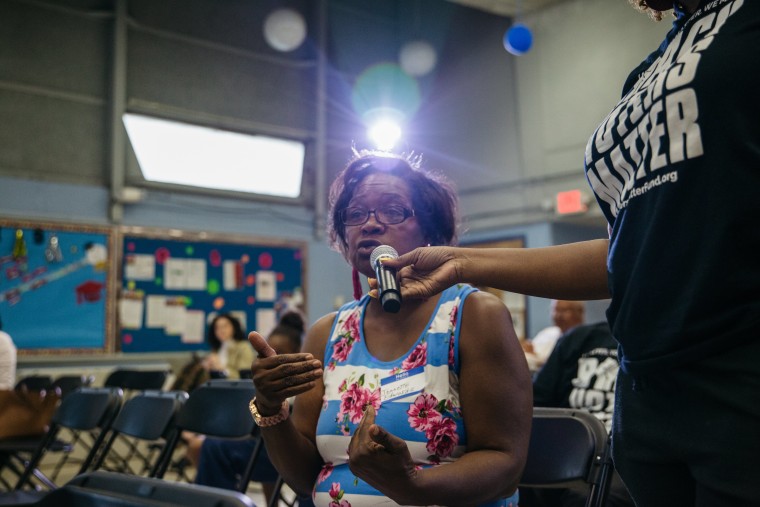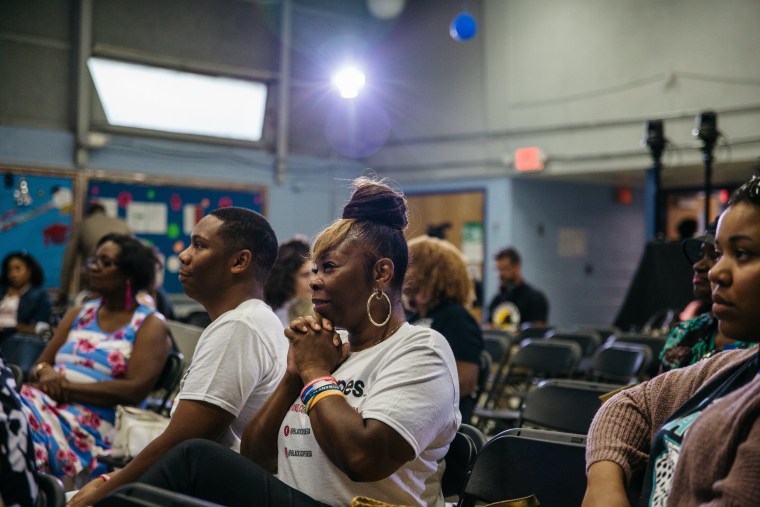DETROIT — Amber Hasan describes herself as a selective voter, a term that does not surface in national polls or nightly cable TV assessments of the American political landscape.
“It simply made no sense to me in 2016 to select, to actually cast a vote, to choose between a racist and a war monger,” Hasan, a small business owner who lives in Flint, Michigan, said Wednesday night at a watch party on the second night of this week's two-night Democratic presidential debate, held in Detroit and hosted by CNN. “So, this time I’m here early in the process. I’m listening.”
Voters like Hasan offer a window on the political concerns, behavior and activity of a key segment of Democratic voters — black voters, particularly black women — without which no Democratic candidate can hope to win the White House. In 2016, Hasan was one of about 2.64 million registered Michigan voters who opted not to vote in 2016, allowing President Donald Trump to secure victory with just 10,704 more votes than the Democratic nominee, Hillary Clinton. But the group of about 150 mostly black voters drawn to the watch parties hosted by Black Voters Matter, a PAC working to engage black voters across the country, resisted generalization.
Chenita Gary watched the 10 candidates each night square off at both Tuesday's watch party at Detroit’s Charles H. Wright Museum of African American History and Wednesday's at a community center in Flint.
“The first priority is change, change in that White House for the health and sanity of our nation,” said Gary, a Detroit resident who is active with a national political organization, The Black Women’s Roundtable. “But I think what I need to hear is more than the buzzwords — the mentions of criminal justice reform and living wages and health care. I’m looking for a candidate who understands how those things intersect in people’s lives, for the person who can engage young voters and who can show me a history of actions that match with their words.”
Chatter in both audiences, applause, small bits of vocal affirmation and even nods of agreement followed debate-stage comments by Sens. Elizabeth Warren of Massachusetts, Kamala Harris of California, Bernie Sanders of Vermont, as well as entrepreneur Andrew Yang. The earthbound, emotional elements of lifestyle-guru Marianne Williamson’s assessment of racial conditions also garnered open support. But, former Vice President Joe Biden, the Democratic front-runner who leads with black voters in most polls, did not resonate as much as he had likely hoped.
Detroit and Flint have been battered by decades of manufacturing job losses and receding wages, along with, more recently, environmental and economic crises. Many black voters interviewed at the Black Voters Matter gatherings said local and state officials at times seem eager to paper over the crumbling remains of once thriving cities with condo developments unaffordable to most residents, taxpayer funded recreational facilities, additional electric scooter options and other projects to attract young, white tech workers.
That activity, several people interviewed said, does little to create jobs with living wages, to improve schools, parks, libraries and community centers. Presidential candidates, several people interviewed said, often offer policy solutions that suit the candidate’s political ambitions and ignore local needs.
The numerous health care discussions promoted mixed reactions from some residents. Jeanette Edwards, a retired Flint public school employee and union member who attended the Flint watch party Wednesday, was irritated when candidates on Tuesday repeatedly framed union plans as broadly popular.
“I am looking for something that works,” said Edwards, who said she is deeply unhappy with her current plan. She spends about a third of her monthly retirement income on medications, she said. Just 10.5 percent of American workers, like Edwards, belonged to unions in 2018.

“I am looking for something compassionate and complete,” Edwards continued. “I want everyone to be covered. I want everyone to receive quality care. And I want that to come in a way where someone like me who worked so hard, for so long, does not pay more than the person who never worked at all.”
During the Wednesday debate round, Biden’s explanation of his health care plan left Edwards unimpressed. She said she was interested in learning more about Harris' plan but that the senator's “frazzled” explanations did not provide clarity.
Mention of reparations on Tuesday's debate stage prompted a lively conversation at the Detroit event.
Former Rep. John Conyers, whose district covered parts of Detroit, repeatedly introduced a bill calling for a study of reparations for the descendants of slaves before he resigned over allegations of sexual harassment in 2017. But that bill was a “toothless” sham, audience member Ken White told the group gathered at the museum.
“To me, reparations are the issue,” White, who lives in nearby Potomac, said. “Black people are on the verge of being permanently locked out of any and all economic opportunity. I mean what does it mean if you have health care but can’t buy a thing to eat?”
At the watch parties, references to the water crisis in Flint on both nights generated some of the most pronounced audience responses. Flint residents like Edwards still spend hours waiting in long lines for bottled water as work to replace pipes and other infrastructure continues. Both of Edwards’ grandchildren have detectable levels of lead in their blood, she said.
During a commercial break that followed the Flint mentions on stage, Claire McClinton, a long-time Flint resident and activist championing a wide range of community-sanctioned responses, stood up and addressed the roused and chattering room. The mention of their city, she said, was a “mixed blessing.”
“I just feel like it’s another conversation, more talk and chatter,” McClinton told NBC News in an interview after the watch party. “Attention is a good thing. But we have to say what we need and get that. They can’t tell us what we want and call it done."

